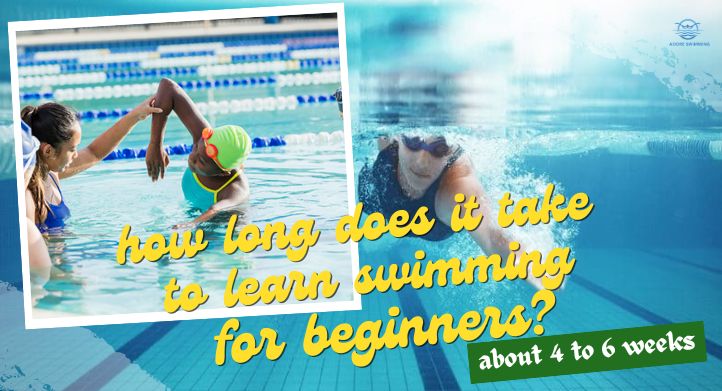how long does it take to learn swimming for beginners?
When it comes to Swimming for Beginners, learning basic skills typically takes about 4 to 6 weeks if you practice 2 to 3 times per week.
However, the real answer is that it depends on each person’s journey with water and how they learn to start swimming.
A Timeline Breakdown to understand how long it takes to learn swimming for beginners!
If we want to break down the timeline of the answer to this question, how long does it take to learn swimming for beginners?
- 1 – 5 Hours: In this phase, you’ll learn to put your face in the water and blow bubbles, control your breathing. For those with a fear of water, this phase might take longer, and that’s perfectly okay.
- 5 – 15 Hours: You’ll learn how to float on your front and back and how to propel yourself with a basic kick. You’ll move from being a “vertical” human in the water to a “horizontal” one.
- 15 – 30 Hours: This is the integration phase. You’ll start coordinating your arms, kicking, and breathing. By the end of this stage, you should be able to swim a short distance (15-25 meters) of a recognizable stroke, which is backstroke.
- 30 – 50+ Hours: You will learn to swim well. This phase is about refining your technique, building the stamina to swim multiple laps without stopping, and potentially learning a second stroke like breaststroke or freestyle.
5 Factors That Dictate Your Learning Speed
Based on hundreds of real-world experiences, these are the factors that truly define your timeline:
1. Your Relationship with Water (The Fear Factor)
If you want to answer this question, how long does it take to learn swimming for beginners?
you should know that the answer is really depends on the reasons below:
- No Fear: If you already love the water and are comfortable splashing around, you’re starting on level 5. Your journey will be mostly about technique.
- Mild Apprehension: You might be nervous about deep water or putting your face under. It will take a few lessons to build trust with the water and your instructor.
- True Aquaphobia: If you have a deep-seated fear, often from a past traumatic experience, your first goal isn’t swimming—it’s building a positive relationship with the water. This can take months, and a patient, qualified instructor is non-negotiable.
- If we want to give an example: one of my swimmers, when she was a little kid, her uncle pushed her head underwater just for fun and laughing, and after that, she had aquaphobia. So it took time just for her to be able to put her face in the water without a panic attack.
2. The Quality of Instruction
Self-teaching is incredibly difficult in swimming because you can’t see what you’re doing.
- Group Lessons: Cost-effective and good for getting started. These kinds of classes are good to start floating and just learn how to swim backstroke, no more.
- Private Lessons: More expensive, but if you’re fearful or struggling with a specific technique (like breathing), you should participate in these classes.
3. Consistency of Practice
Learning to swim is about building muscle memory.
- Practicing once a week will lead to steady but slow progress.
- Practicing 2-3 times a week will lead you to fast progress, and you can be more ready to swim competitively.
4. . The "Breathing Breakthrough"
Nearly every beginner’s journey includes a challenge, which is called coordinating breathing with the stroke.
it’s a technical and mental skill to exhale completely underwater and turn to inhale without panicking. It’s common to feel stuck on this for weeks.
Once it is done, your progress will feel like it’s taking off.
5. Your Definition of "Learned"
What is your end goal?
- Water Safe: You want to be able to survive an accidental fall into a pool. (Can often be achieved in 10-15 hours).
- Vacation Swimmer: You want to comfortably swim around in a resort pool or at the beach. (Typically 20-30 hours).
- Lap Swimmer: You want to swim for fitness, completing continuous laps with good form that takes 40-50+ hours.
FAQs:
How long does it take to learn how to swim for adults?
For most adults, it takes between 20 to 30 hours of quality practice to learn the fundamentals and be able to swim a recognizable stroke for one pool length. Also take a look at this article: How long does it take to learn how to swim for adults?
How long does it take to learn freestyle swimming?
- The Basics (15-30 hours): This is the stage where you learn to kick, and how to do the basic arm strokes, and turning your head to the side to breathe. By the end of this phase, you should be able to swim one length of a pool (25 meters).
- Proficiency (50+ hours): You can swim multiple laps without stopping
In reality, after 20 hours of lessons, you can swim freestyle, but in a year, people can call you a freestyle swimmer!
How long does it take to learn to swim in deep water?
Technically, it takes zero extra time. The challenge is mental. The time it takes is the time you need to overcome the fear of not being able to touch the bottom.
Once you trust that your skills work just as well in deep water, the fear vanishes. For some, this is a 5-minute process. For others with more anxiety, it can take several lessons.
Can I learn swimming at 30?
Yes, absolutely. There are a lot of success stories of people starting in their 30s. In many ways, 30 is a great age to learn.
You have the motivation, focus, and resources to get good instruction. The main challenge compared to a child is overcoming your fear.
Can I learn swimming in 1 month?
Yes, you can learn the basics in one month. With 2 to 3 sessions per week, in one month, a typical adult beginner can achieve:
- Water comfort and breath control.
- The ability to float on their front and back.
- A basic, functional kick.
- The ability to swim a short distance (10-25 meters)
How long does it take to learn to swim for a 5 year old?
For a 5-year-old, learning to swim a basic stroke takes a few months of weekly lessons. Kids have advantages: less fear, and they don't overthink things. The process is usually more about fun and games.
Is swimming easy to learn for adults?
No, it's not easy, but it is very achievable. The reasons that it made it hard are:
- Fear: Adults have more fears and anxieties about starting to learn a new skill.
- Overthinking: We try to analyze every movement, which leads to stiffness.
- Body Awareness: We are often less in tune with how our bodies move.
- Breathing: The act of exhaling underwater feels profoundly unnatural and takes significant time to master.
Can I learn to swim in 10 days? Can I learn swimming in 3 weeks?
In a 10-day or 3-week course, you can expect to learn survival skills and basic water safety. This means you'll learn to:
- Control your breathing.
- Float
- kick
How long does it take to see beginner results for swimming?
You will see results in your very first lesson. Beginner results aren't about swimming laps; they are about hitting milestones.
- First 1-2 hours: The first result is being able to put your face in the water and blow bubbles.
- First 2-5 hours: The next result is learning to float.
- First 5-10 hours: The next result is using a kickboard to do flutter kick.
Can I learn swimming by myself?
It’s difficult because:
- When you are swimming, you can not see your hand, and there should be a person to see you and have the profession to tell you what to do to make it better.
- One of the important things in swimming is how to breathe, and only an expert can tell you how to do it.
- Without having the skill is dangerous to do it by yourself.
Can I learn swimming at 40?
100% yes. Learning at any age, like 40, is completely achievable and very common. One of my swimmers was 45, and it took her a year that he could swim 400 meters.
It really depends on your interests. Sometimes, at the age when your mind is free of many problems like having children or having a job, it is the best time to learn a new skill like swimming.



Leave A Comment